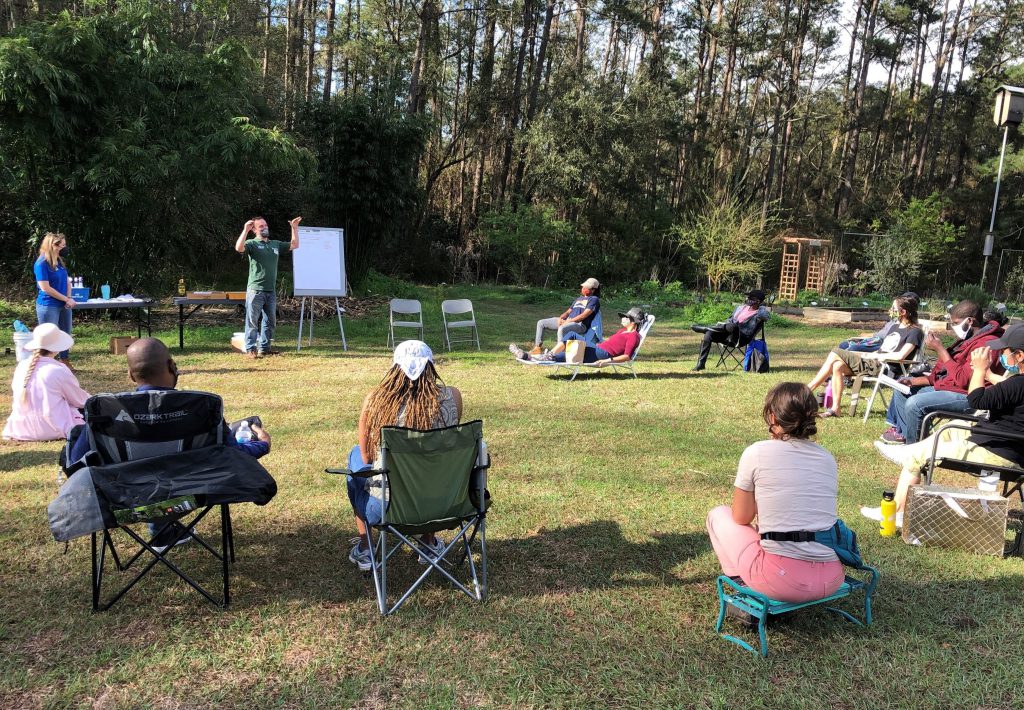
Extension agents taught training participants about integrated pest management at the UF/IFAS Leon County Extension Office. Photo by Molly Jameson.
–
Throughout the Panhandle and Big Bend Region of Florida, many residents struggle to access healthy foods. Of the 20 Florida counties with the most people living in poverty, more than half are in the Panhandle and Big Bend Region. Unfortunately, poverty leads to food insecurity, and urban and rural populations are thus endangered, especially because they have less access to healthy foods.
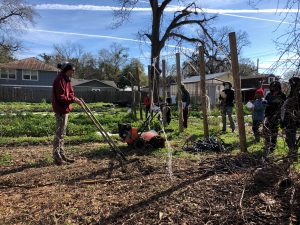
Farmer Dave taught training participants about how to build soil beds and seed crops at Liberty Farms. Photo by Molly Jameson.
On average, only 10.8% of Americans are meeting the standard for daily fruit and vegetable consumption (Centers for Disease Control and Prevention, 2015). According to a USDA Economic Research Study, purchasing fruits and vegetables from direct-to-consumer outlets, such as from farmers at farmer’s markets and roadside stands, was positively associated with several healthy behaviors. Households who did so were more likely to be aware of the USDA’s MyPlate guidelines, rate their diets as excellent or very good, and were nearly twice as likely to have a vegetable garden (USDA, 2018).
To help address food insecurity, we need more farmers to grow healthy produce for direct-to-consumer outlets. Unfortunately, farmers are an aging group. In Leon County, farmers averaged 59.8 years of age in 2007, and 62.2 in 2012 (Census of Agriculture). It is not only important to recruit a younger farmer workforce, but it is also important to assist these young farmers with the many challenges they will face. These challenges can include factors like access to land, developing the skills needed to farm and run a business, and navigating the many aspects of food safety.
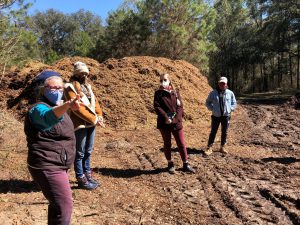
Louise Divine explained the composting process to the training participants at Turkey Hill Farm. Photo by Molly Jameson.
In an effort to address this issue in the Big Bend Region, the City of Tallahassee, with funding from the Knight Foundation, has partnered with Tallahassee Community College’s (TCC) Wakulla Environmental Institute, Florida Agricultural and Mechanical University’s (FAMU) Small Business Development Center, multiple local small farmers, UF/IFAS Extension, FAMU Extension, and other partners to deliver a 12-week Urban Farming and Entrepreneurship Training Program.
Coordinating the program is local farmer Sarah Bardolph, of Toad Lily Farm, who grows a variety of produce in Tallahassee for direct-to-consumer outlets, such as the Tallahassee Farmer’s Market and the Red Hills Online Market.
With the ongoing pandemic, the Urban Farming and Entrepreneurship Training Program has utilized a mixture of virtual programming and in-person, outdoor, hands-on programming to teach 12 beginning farmers a variety of skills.
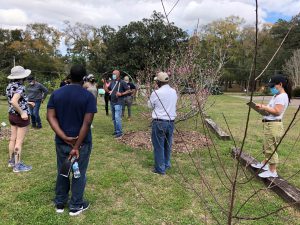
Extension agent Trevor Hylton taught training participants about pruning fruit trees at the UF/IFAS Leon County Extension Office. Photo by Molly Jameson.
Topics include how to start a farming business and write a business plan; finding and assessing land; soil health and conservation; site selection and installation; marketing and distribution; produce safety regulations; accounting and bookkeeping; propagation and planting; weed, pest, and disease management; harvesting and post-harvest food safety; tools and supplies; indoor farming systems; market research and diversification; and more.
Now in week 10, participants have visited seven different locations and have tuned in for five virtual modules, giving the beginning farmers a wide range of experiences and resources.
The beginning farmers started out in-person at City Farm TLH, a new pilot urban farm located on a vacant city-owned parcel in Crawfordville developed by the City of Tallahassee last October. They’ve also visited the Frenchtown Urban Farm, the Frenchtown Farmers Market, Liberty Farms, Turkey Hill Farm, Full Earth Farm, and the UF/IFAS Leon County Extension Office.
The instructors of the virtual modules have been both farmers and university faculty, including leaders of the FAMU Small Business Development Center, UF/IFAS Extension Leon County, and Handsome Harvest Farm.
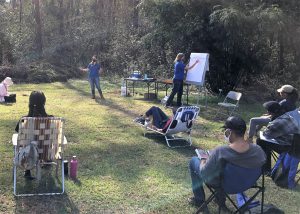
Extension agents taught participants about identifying insects at the UF/IFAS Leon County Extension Office. Photo by Mark Tancig.
Upon completion of the program, participants will earn a Small Plot Farming Certificate from TCC’s Wakulla Environmental Institute. Additionally, this program seeks to establish partnerships with local farmers who can provide apprenticeships to participants upon completion of the program so they can receive real-life farming experience.
Interested in becoming a farmer? The City of Tallahassee is coordinating the Urban Farming and Entrepreneurship Training Program again this fall! Please e-mail Sarah Bardolph at toadlilyfarm@gmail.com for information about how to apply and check the City of Tallahassee’s City Farm TLH website for more about the program (talgov.com/cityfarm).
Recruiting and assisting the next generation of farmers is a very important step for strengthening our local food system, addressing food insecurity, and striving to improve access to healthy foods for the people in our community.
- Pest Alert: Invasive ‘Yellow-Legged Hornet’ Poses Threat to Honey Bees - February 9, 2024
- Exploring the Ancient History of Florida’s Soils - August 4, 2023
- Show Your Love for Potatoes: Plant Them this Valentine’s Day - February 10, 2023
